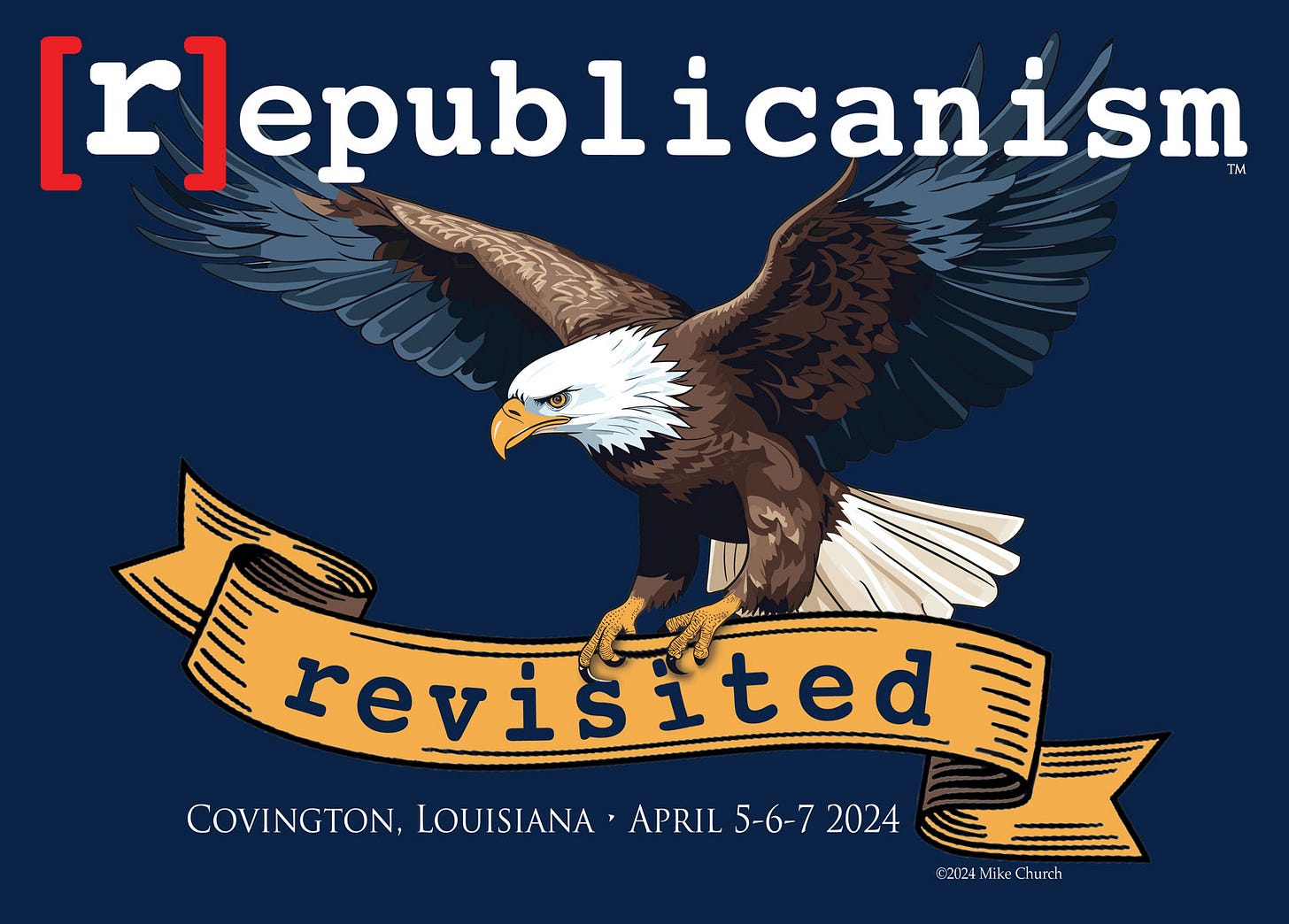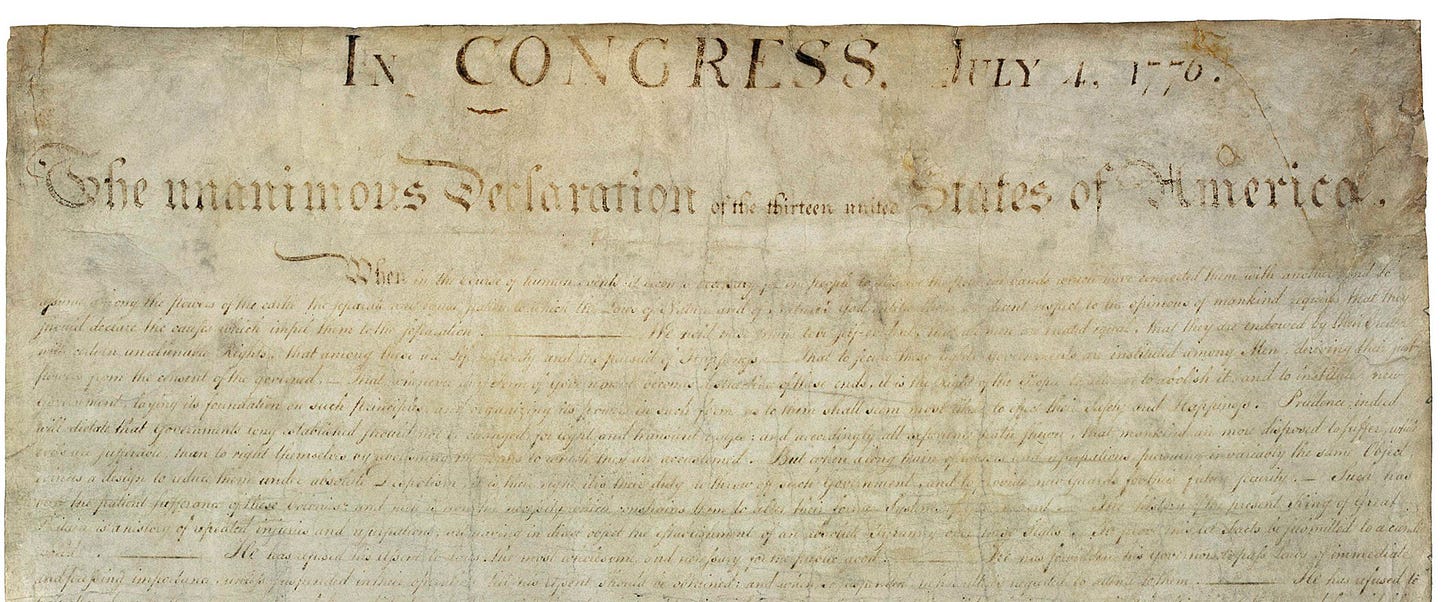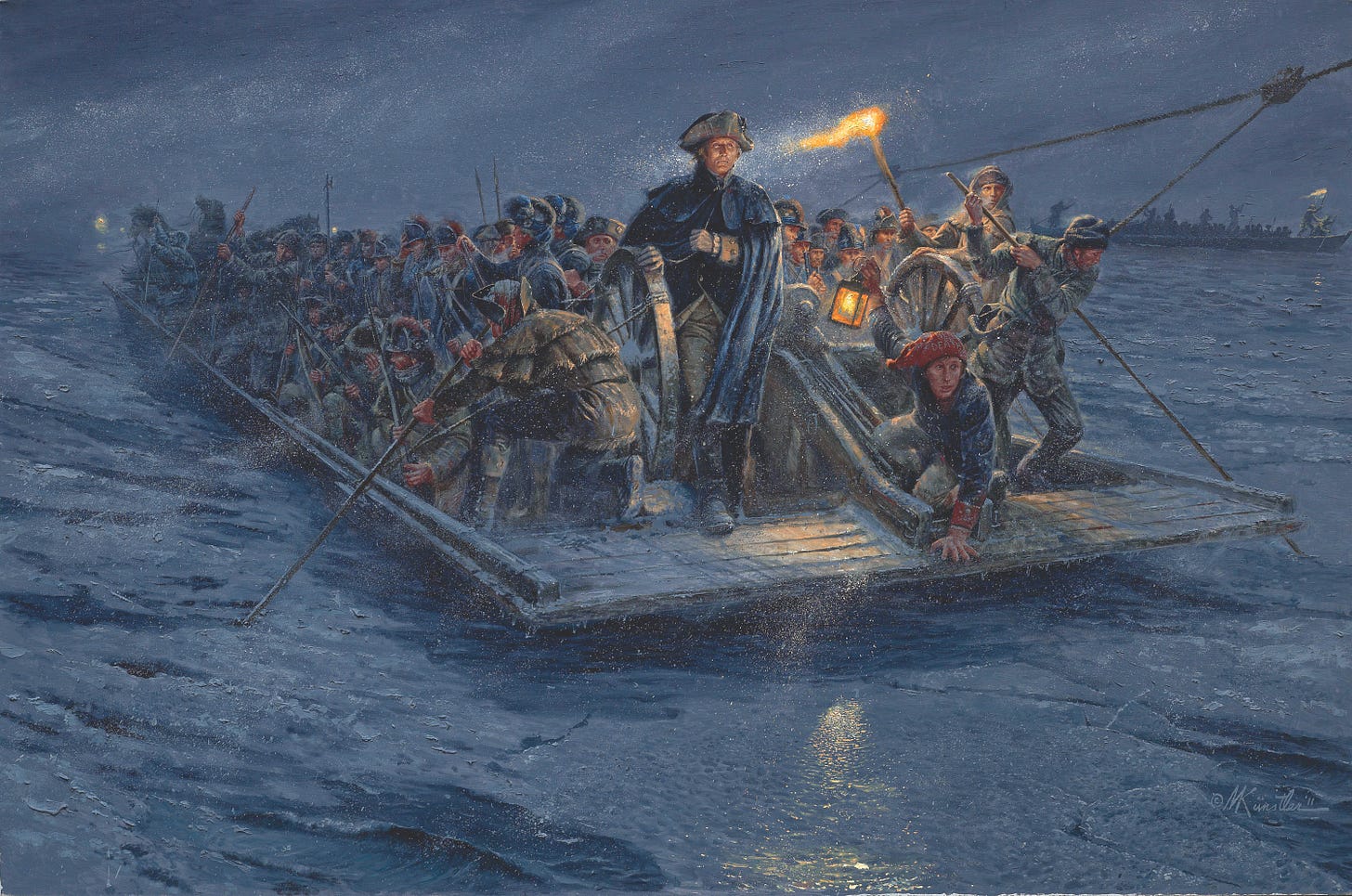What Does This Moment Call For? A Return To [r]epublicanism (subsidiarity)
The 2024 CRUSADER Congress Wants You!

“To the question of whether the prevailing form of government — monarchy — was divinely protected and absolute, [Saint Robert] Bellarmine contended that the best form of government was actually a "combination" of monarchy, aristocracy and democracy. Though not popular at the time, he defended these principles, which today we consider the foundations of our democratic process.” - Bellermine’s influence on the Declaration of Independence
Recently, I have been asked WHAT is [r]epublicanism and more importantly "why should I care"? Well, those are fair questions and I'll take a stab at answering them both. Which I pray will get you excited about the term and excited to attend and Congress with us in April to talk about bringing it back to ‘Murican gubbmint!
Thomas Jefferson gave the best secular explanation of [r]epublicanism I have ever read. Chesterton and Belloc give great explanations of it as "Distributism", too. Here's TJ.
“Indeed, it must be acknowledged, that the term republic is of very vague application in every language. Witness the self-styled republics of Holland, Switzerland, Genoa, Venice, Poland. Were I to assign to this term a precise and definite idea, I would say, purely and simply, it means a government by its citizens in mass, acting directly and personally, according to rules established by the majority; and that every other government is more or less republican, in proportion as it has in its composition more or less of this ingredient of the direct action of the citizens. Such a government is evidently restrained to very narrow limits of space and population. I doubt if it would be practicable beyond the extent of a New England township.”
The United States, began with this as the model, it was still the model in the rural midwest and across the South until Roosevelt and the New Deal ('Murican communism), Alexis de Touqueville wrote a book about it called Democracy In America in which he marveled at how well [r]epublicanism was working here. Here in the post-Appomatox South there are still remnants of what Touqueville saw especially in the remaining thriving small towns like Arnaudville and Scott, Louisiana and Dahlonega, GA. Still, all 3 would be dramatically improved with a restoration of [r]epublicanism AND, this is a requisite, a restoration of Truth at the top of the hierarchy. Richard Weaver author of The Southern Tradition at Bay was the last living Southern scholar on this as Thomas Landess recounts.
And what kind of society do the falsifiers of truth depict for Americans to admire? Weaver concludes that we are urged to be spoiled children, addicted to comfort and incapable of any heroic sacrifice, a generation of undisciplined egotists who are less and less willing to work for the plethora of material goods our leaders tell us we deserve. In addition, he points out that, driven by envy and bewildered by the presence of unequal wealth when he cannot admit unequal merit, modern man moves to take away the property of others with the fallacious argument that “property rights should not be allowed to stand in the way of human rights.”
It is important to note here that Weaver considers property to be “the last metaphysical right” upon which other rights depend, and he does so not out of any deep-seated conviction that the free-market economy is superior to collectivism or that capitalism is the salvation of the West, but out of a reasonable assumption about the essential nature of freedom and man’s capacity to act morally when he is owned outright by some impersonal social institution, however benevolently conceived. Here and only here does Weaver’s traditionalism strike a sort of accommodation with the economic conservatives of the Northeast. The rest of the time they stand beyond the pale of his philosophy and are often the enemy, particularly when they smack of social Darwinism.
Today's neocons and progressives both share this rotten brain, Northeast economic conservatism i.e. what I will call the "prosperity gospel of fractional reserve banking and make-work government." Simply put the bankers enable the borrowing the governing class needs while making work of war and forced urban destruction then fake repair. Robert Higgs describes this process best in his epic book CRISIS AND LEVIATHAN.
Trends and crises interact. Because trends bring about the particular preconditions on which each crisis bursts, they affect how each crisis unfolds. And because each crisis leaves the long-run condition of the economic and political systems altered, it affects later trends. Although many economists have dismissed crisis events as “aberrations” or statistical “outliers” in the growth of government, this practice is a serious mistake: the long run, after all, is nothing more than a series of short runs.
Watch Higgs explain how Crisis & Leviathan work hand in glove for the enrichment of the few at the direct and permanent expense of the many i.e. the antithesis of [r]epublicanism.
[r]epublicanism then is basically a system of Christian subsidiarity where IF there is to be government action taken it must be agreed upon by near unanimity and it must act only upon the people/situations it was authorized by. John Adams, whilst commenting on the upcoming vote on the Lee Resolution i.e. The Declaration of Independence, recognized this in the largest scale then imaginable; he was joined by South Carolina’s Edward Rutledge and Pennsylvania’s John Dickinson and Robert Morris (both Quakers and conscientious objectors to war); Morris and Dicksinson both left the room before the vote so Pennsylvania could vote “yes” and make the vote unanimous.

The closest modern model of what I am talking about when I say [r]epublicanism is in The Swiss Confederation as described on an “About Switzerland” a state owned website.
Switzerland's political structure consists of the Confederation, 26 cantons and over 2,000 communes. Political and legislative powers are distributed across these three levels in a way that grants each of them the greatest possible autonomy and brings a diverse range of political stakeholders together under one roof. Cantons act as constituent states and have their own constitutions, parliaments, governments and courts.
In their own description, the Swiss even use the term “subsidiarity”.
Within the state structure, power is allocated based on the principle of subsidiarity. Communes, which are the smallest political entity, are accorded as much autonomy as possible. This is done so that they can carry out as many tasks as possible themselves. Tasks are only delegated to the next level up – that is, the cantons – when this makes sense. The same applies when delegating to the highest level, which is the Confederation.
The communes, for example, maintain and manage their own infrastructure, including roads and public buildings such as schools. The cantons take on higher-level duties including the school system and policing, while the Confederation is responsible for national security and foreign policy. Each of the three raises its own taxes to help manage the tasks allocated to it.
The ‘Murican system already has this model in place, we have simply grown too lazy to demand it be utilized and reformed where needed. The Federal monster would act as a mediator for Free Trade and other national/union-wide treaties; Declarations of War & The enumerated powers in the Constitution; the States would act as The Confederation, the Counties as Cantons and the towns/cities as communes. For this system to work again I believe we, that is all men of good, Christian will should work for several obtainable objectives; among them are:
Reform of Congressional apportionment to 50k constituents per Congressional district.
Repeal the 14th Amendment (it’s antiquated and is used almost exclusively to broaden Federal powers.)
Repeal the 17th Amendment. (The Senate MUST represent the State Legislatures NOT the people)
Adopt a Balanced Budget Amendment. (States must be deprived of borrowing power under the guise of Federal mandates)
Again, the Swiss have this one, The Federal gubbmint’s role, correct.
The [Congress] Confederation only undertakes tasks that the Cantons are unable to perform or which require uniform regulation by the Confederation.
There’s much more that we can and will discuss here and in Congress.
WHY SHOULD I CARE? IT’S ALL RIGGED ANYWAY!
“There are two great forces in ‘Murican politics, apathy and inertia. We have too much of the former and almost none of the latter.” Dr. Kevin Gutzman
I’ve heard directly from some people and indirectly from many, many others that no one should care about our politics and elections any longer because our elite ruling masters are going to do what they want to do regardless of what we tell them. That voting them out won’t help because the new people will become corrupted too; even worse, most of the currently corrupted can’t be voted out because the elections are all rigged in their favor. And the best one I hear lately is that if you do vote then you’ve just endorsed the corruption and given it your stamp of approval.
Does the above apply to an alcoholic, drug or sex/porn addict in your immediate family? Does it apply to the schools you send your children to? If you are employed by a corporation and believe that you’ll never advance or positions or have your wages keep pace with inflation, yet you still go to work every day to support your family, have you endorsed the boss’s greedy policies? When you cash your check do you have to go confess that you committed the sin of usury if usury was employed somewhere in your wage?
My point in the comparisons is that the situation today, yeah, it may be all of the above, ok, doesn’t that make the man who Thomas Paine might call the Winter Soldier (who he juxtaposed to the “sunshine patriot”) the indispensable man?
These are the times that try men’s souls. The summer soldier and the sunshine patriot will, in this crisis, shrink from the service of their country; but he that stands it now deserves the love and thanks of man and woman. Tyranny, like hell, is not easily conquered; yet we have this consolation with us, that the harder the conflict, the more glorious the triumph.
I agree and I put my money on that when I directed and produced Times That Try Men’s Souls about Washington’s Crossing of the Delaware river, a story almost no one alive today knows the actual nuts and bolts of. Did you know for example that Washington lost nearly half his men to a combination of desertion and poaching (General Lee wanted Washington’s command. To get it and to force his defeat in New York, led 4,000 of Washington’s men, 200 miles away on a mission that didn’t exist!) When the remaining troops commissions expired on December 15th, the only reason he kept the other half was because John Hancock basically wrote him a hot check to cover reenlistments. By taking Trenton on Christmas night, Washington changed the game and the rules of the game. We all know the rest of the story but pay attention to what Paine wrote above because he was IN that group of 4,000 soldiers who stayed.
Just because the enemy has gained the advantage in politics and the institutions doesn’t mean they can hold it. So why not resolve to take it from them because they stole some of it on our watch!?
I invite you to consider attending our upcoming Congress (see the tentative schedule, here) to meet men of the mettle that can correct some of the wrongs listed above and in mine and many others, works (read my friends Matthew Crawford and Frank Wright for example). I’ll leave you with Paine’s conclusion
Voltaire has remarked that King William never appeared to full advantage but in difficulties and in action; the same remark may be made on General Washington, for the character fits him. There is a natural firmness in some minds which cannot be unlocked by trifles, but which, when unlocked, discovers a cabinet of fortitude; and I reckon it among those kind of public blessings, which we do not immediately see, that God hath blessed him with uninterrupted health, and given him a mind that can flourish upon care.





